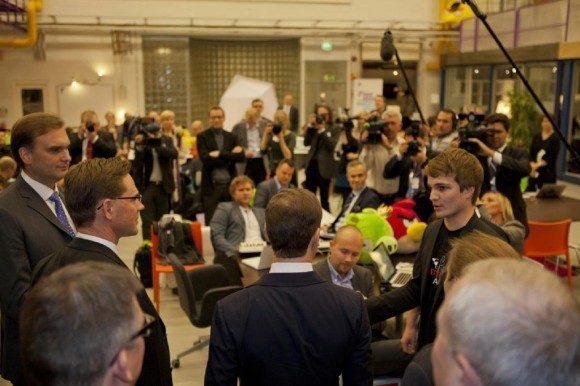 In Stockholm after last Saturday’s Stockholm Start-Up Day I met up with Miki Kuusi, main organizer of Helsinki’s Slush conference, to talk about the day’s conference and the perceived differences between Stockholm and Helsinki’s startup scene. Kuusi knows a thing or two about how Helsinki’s scene has developed in recent years; during his tenure as president of Aalto Entrepreneurship Society, CEO at Startup Sauna, and a short time at Supercell, he’s been one of the lead characters in the story that is today’s Helsinki startup scene. And now, for the Arctic15 one month away, we’re getting him up on stage in a different role, to give a talk about his experience in Helsinki and how startup scenes come together.
In Stockholm after last Saturday’s Stockholm Start-Up Day I met up with Miki Kuusi, main organizer of Helsinki’s Slush conference, to talk about the day’s conference and the perceived differences between Stockholm and Helsinki’s startup scene. Kuusi knows a thing or two about how Helsinki’s scene has developed in recent years; during his tenure as president of Aalto Entrepreneurship Society, CEO at Startup Sauna, and a short time at Supercell, he’s been one of the lead characters in the story that is today’s Helsinki startup scene. And now, for the Arctic15 one month away, we’re getting him up on stage in a different role, to give a talk about his experience in Helsinki and how startup scenes come together.
The first thing that Kuusi points out is that how developed Stockholm’s startups scene is with later-stage startups. While Helsinki’s gaming companies are growing up quick, what’s notable in Stockholm is the number of startups that have made it into the later stage, with companies like King already IPOing and Spotify’s IPO rumored to soon be approaching. More powerhouses abound, with Klarna and Tradedoubler as household names. Stockholm does something right when it comes to late-stage companies.
With all this wealth of knowledge, it seems that Stockholm could learn about how Helsinki seems to get the “early stage” right. Myself and Kuusi have noticed that the Stockholm startup scene seems divided into different groups and camps that aren’t as accessible as Helsinki. Start-Up Day has grown to be one of the main startup events in Stockholm, but you still don’t see many of the key people walking around, like you might with Peter Vesterbacka or Ilkka Paananen at Helsinki-events. What’s missing, Kuusi says, is more grass-roots organizations really focused on bringing knowledge down and making successful entrepreneurs more accessible.
He points to the fact that nearly every successful company you see in the Nordics, or worldwide, has been started by a serial entrepreneur. Maybe the Klarna founders straight out of university are the exception, but it’s tough to think of any of the successful companies that started from scratch. Knowledge sharing by these founders shortens the loop between failed companies and successful ones.
“That was one important thing that happened in Helsinki. Startup Sauna was the first thing to bridge the gap between serial entrepreneurs and first-time entrepreneurs. I think the key thing in Stockholm would be to get this type of thing going as well.”
While Kuusi points out there’s a wealth of history that led up to what Helsinki’s startup scene is today, many recent components here came from students. Aalto University and Startup Sauna are student-driven organizations trying to solve the lack of tutoring and mentorship they saw in Silicon Valley. And Kuusi points out that this own blog was started by people out of college who noticed that no one was writing about startups in English here, so they created their own blog.
Most importantly, it’s about driven people putting these things together. “Without Kristo Ovaska, there’s no Startup Sauna. Without Peter Vesterbaka, there’s no Slush. Without Ville Vestereinen and the other guys, there’s no ArcticStartup.”
Have any thoughts about the differences between Helsinki and Stockholm? Or do you need to see the Helsinki scene for yourself? Let’s share knowledge between the region at Arctic15: Exit Path, May 27th and 28th in Helsinki. Grab your tickets today to still get early-bird pricing!




